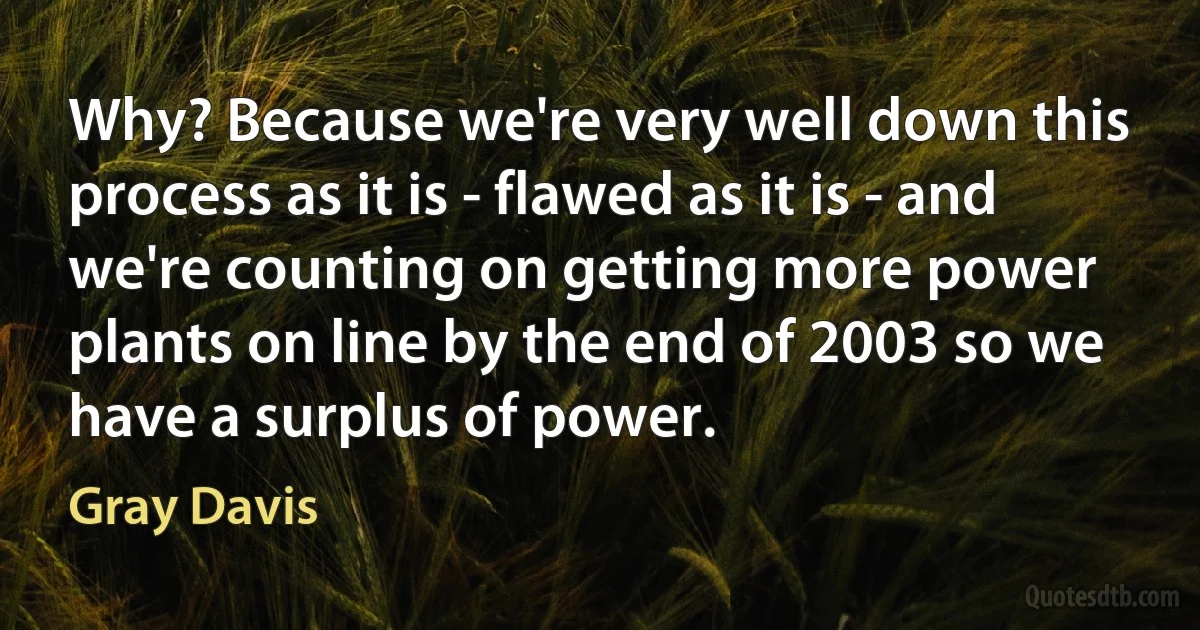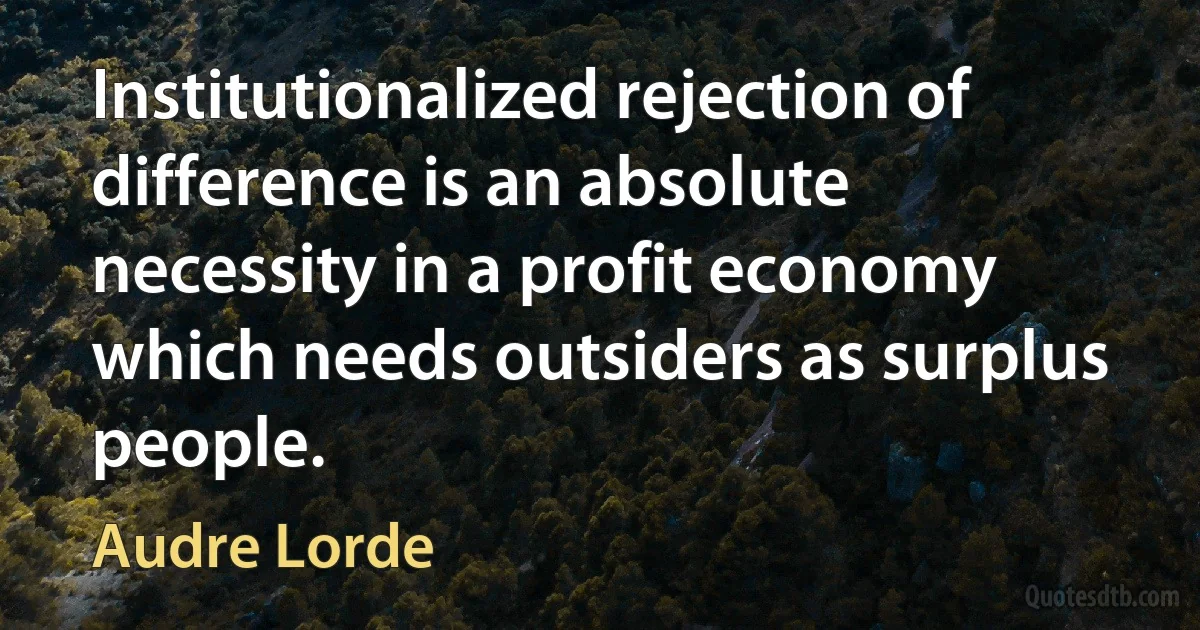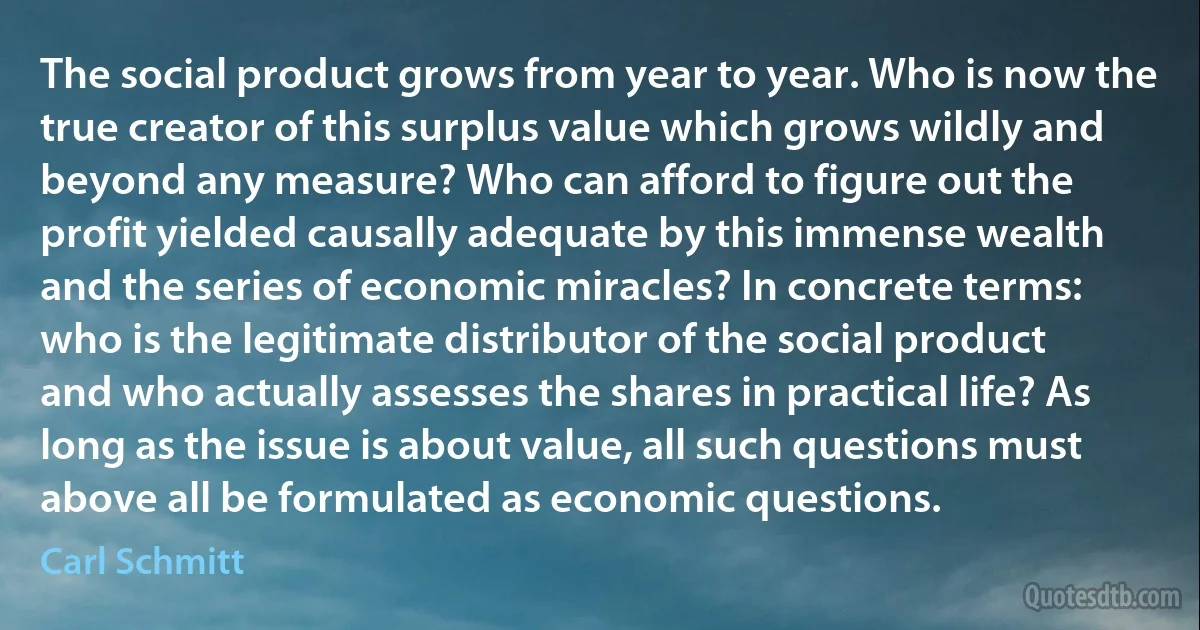Surplus Quotes - page 3
Such a condition will likewise give opportunity to devote our surplus wealth, not to the payment of high taxes, but to the financing of the needs of other nations. Our country has already through private sources recognized the requirements in this direction and has made large advances to foreign governments and foreign enterprises for the purpose of reestablishing their public credit and their private industry.

Calvin Coolidge
That passivity was the essence of the problem. The human being was intended to be passive only in a condition of fatigue, and not always then. Too much passivity of body produced surplus fat, short-windedness, indigestion: passivity of mind produced the same symptoms on the mental level. a feeling of spiritual dyspepsia. Since the average human being has no purposes that are not connected with the activities of keeping alive, the black room was bound to produce passivity, increasing dullness, a state in which the mind is at once awake and static, motionless, stagnant. This sense of dullness was nothing less than the collapse of the sense of reality and of values, the retreat into one's inner world.

Colin Wilson
Being a beggar, he said, was not his fault, and he refused either to have any compunction about it or to let it trouble him. He was the enemy of society, and quite ready to take to crime if he saw a good opportunity. He refused on principle to be thrifty. In the summer he saved nothing, spending his surplus earnings on drink, as he did not care about women. If he was penniless when winter came on, then society must look after him. He was ready to extract every penny he could from charity, provided that he was not expected to say thank you for it. He avoided religious charities, however, for he said it stuck in his throat to sing hymns for buns. He had various other points of honour; for instance, it was his boast that never in his life, even when starving, had he picked up a cigarette end. He considered himself in a class above the ordinary run of beggars, who, he said, were an abject lot, without even the decency to be ungrateful.

George Orwell
Of course it's tempting to close one's eyes to history, and instead speculate about the roots of war in some possible animal instinct: as if, like the tiger, we still had to kill to live, or, like the robin redbreast, to defend a nesting territory. But war, organized war, is not a human instinct. It is a highly planned and cooperative form of theft. And that form of theft began 10,000 years ago when the harvesters of wheat accumulated a surplus and the nomads rose out of the desert to rob them of what they themselves could not provide. The evidence for that, we saw, in the walled city of Jericho and its prehistoric tower... That is the beginning of war.

Jacob Bronowski
The cities of that period were rather shabby affairs. If you had the taste to make them splendid, which I would not be so rude as to question, the general poverty resulting from your extraordinary industrial system would not have given you the means. Moreover, the excessive individualism which then prevailed was inconsistent with much public spirit. What little wealth you had seems almost wholly to have been lavished in private luxury. Nowadays, on the contrary, there is no destination of the surplus wealth so popular as the adornment of the city, which all enjoy in equal degree.

Edward Bellamy
Money is indispensable to a long-circuit heavy load energy system. It must be used when a sufficient surplus is being produced to allow a margin for exchange, and cost of transport, over a considerable distance. Money represents a storage battery when idle, and a generalized mode of the conversion of energy when it is in motion, with a function of equating time and space.

Isabel Paterson
Of all the elements of critical importance to plants, phosophorus is the least commonly found, and sources are rarely available locally. Of all the phosphatic fertilisers used, Europe and North America consume 75% (and get least return from this input because of overuse, over-irrigation, and poor soil economy). If we really wanted to reduce world famine, the redirection of these surplus phosphates to the poor soils of Africa and India (or any other food-deficient area) would do it. Forget about miracle plants; we need global ethics for all such essential soil resources. As long as we clear-cultivate, most of this essential and rare resource will end up in the sea.

Bill Mollison
Collectivism, as we know, does not abolish wages, though it introduces considerable modifications into the existing order of things. It only substitutes the State, that is to say, Representative Government, national or local, for the individual employer of labor. Under Collectivism it is the representatives of the nation, or of the district, and deputies and officials who are to have the control of industry. It is they who reserve to themselves the right of employing the surplus of production - in the interests of all.

Peter Kropotkin
The police confront dangers and social miseries of a kind most of us can only imagine. They deal with the waste products of a competitive corporate society: the ill-fed, the ill-housed, the desperate, and the defeated. The slums are not the problem, they are the solution; they are the way capitalism deals with the surplus people of a market economy. And for all they cost the taxpayer in crime, police and welfare, the slums remain a source of profit for certain speculators, arsonists, realtors, big merchants, and others.

Michael Parenti
Ernst Bloch ... recognized the dual character of the religious phenomenon, its oppressive aspect as well as its potential for revolt. The first requires the use of what he called 'the cold stream of Marxism': the relentless materialist analysis of ideologies, idols and idolatries. The second, however, requires 'the warm stream of Marxism', seeking to rescue religion's utopian cultural surplus, its critical and anticipatory force.

Michael Löwy
Art is not, as the metaphysicians say, the manifestation of some mysterious Idea of beauty or God; it is not, as the aesthetical physiologists say, [play or] a game in which one releases surplus energy, ...not the production of pleasing objects, and is above all, not pleasure itself, but it is the means of union among mankind, joining them in the same feelings, and necessary for the life and progress toward the good of the individual and of humanity.

Leo Tolstoy
I'll cut out government spending that's not working, that we can't afford, but I'm also going to ask anybody making over $250,000 a year to go back to the tax rates they were paying under Bill Clinton, back when our economy created 23 million new jobs, the biggest budget surplus in history and everybody did well. Just like we've tried their plan, we tried our plan - and it worked. That's the difference. That's the choice in this election. That's why I'm running for a second term.

Barack Obama
The nature of unemployment today is totally different from what it was a year ago. It is no longer caused by a deficiency of demand. There is no longer a potential surplus supply of the things we want. The transition to full employment is hindered by two obstacles. The first is due to the difficulty of shifting labour to the points where it is wanted. The second- and, for the time being, the chief--obstacle is caused by the difficulties, other than the shortage of labour, in the way of existing demand becoming effective.

John Maynard Keynes



